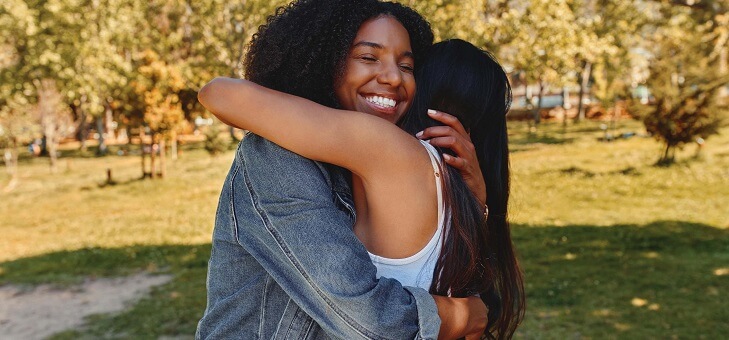As COVID restrictions gradually ease, there’s so much to look forward to – from going to restaurants to spending quality time with friends and family. Many of us will be able to actually embrace loved ones, instead of awkwardly waving at them from a distance.
According to scientists, the benefits of hugging go beyond that warm feeling you get when you hold someone in your arms.
“The opportunities for having that human contact again and having that connection with someone else are immense,” says Dr Shungu Hilda M’gadzah, of Inclusion Psychologists.
It could help decrease loneliness
Hugging can play a bit role in combating loneliness, with Dr M’gadzah suggesting vulnerable groups such as the elderly and those in care homes will particularly benefit. They might have been experiencing “isolation and feeling very much alone” over the past year, she says. “When the doors open and people are able to hug again, that connection and that sense of acceptance and belonging is really key.”
Read: Pets, touch and COVID-19: Why our furry friends are lifesavers
It could help combat anxiety
This rise in loneliness could also be linked to anxiety and depression. Mental health charity Mind reported in 2020: “More than two-thirds of adults with mental health problems reported that their mental health got worse during lockdown. As a direct consequence of the pandemic and all that follows, many people who were previously well will now develop mental health problems.”
Dr M’gadzah says: “We’ve seen increasing numbers in terms of people suffering from anxiety and depression, and for some of us it’s down to that feeling of isolation and not having human contact, and not having someone there who we can either speak to and connect with.” She suggests something as simple as hugging can be “quite nurturing and healing”, and help combat or ease some of these issues.
Read: How focusing on the positives can help your mental health
It could boost self-esteem
“If someone is feeling low and down, then actually, that act of hugging sends a message that someone cares and someone is there for them,” says Dr M’gadzah. “That in itself supports someone; making them feel better about themselves and making them feel more able to combat or tackle any kind of challenges they have – that can include how you perceive and view yourself.”
The psychologist adds: “Self-esteem is a key benefit of hugging, because it supports you to recentre and feel better about yourself in that moment.”
There could also be physical benefits
Hugs also have the potential to positively impact our physical health. One study published in Biological Psychology suggested women who received frequent hugs had lower blood pressure and higher oxytocin levels.
Oxytocin is a chemical in our bodies that scientists sometimes call the cuddle hormone. This is because its levels rise when we hug, touch, or sit close to someone else. Oxytocin is associated with happiness and less stress.
One study found that the positive benefits of oxytocin were strongest in women who had better relationships and more frequent hugs with their romantic partner.
It may be good for your cardiovascular health
Regular hugging – or warm contact in general – might be good for your heart, particularly when it comes to keeping your blood pressure under control in stressful situations.
One study in the Behavioral Medicine Journal had a group of people hold hands with their partner for 10 minutes and then hug for 20 seconds before being sent off to do a public speaking task (aka most people’s biggest fear). Another group of people just rested quietly before being sent into the public speaking task.
The people who’d had the physical contact beforehand had lower blood pressure and lower heart rate increases in response to the stressful situation than the people who hadn’t received any contact.
Read: The secrets behind a good cuddle
Hugs may protect you against illness
Another study by Carnegie Mellon University looked into how hugs might help stop us from getting sick. Lead researcher Sheldon Cohen said: “We know that people experiencing ongoing conflicts with others are less able to fight off cold viruses. We also know that people who report having social support are partly protected from the effects of stress on psychological states, such as depression and anxiety. We tested whether perceptions of social support are equally effective in protecting us from stress-induced susceptibility to infection and also whether receiving hugs might partially account for those feelings of support and themselves protect a person against infection.” He found “those who receive more hugs are somewhat more protected from infection”.
How many hugs do we need?
Family therapist Virginia Satir once said, “We need four hugs a day for survival. We need eight hugs a day for maintenance. We need 12 hugs a day for growth.” While that may sound like a lot of hugs, it seems that many hugs are better than not enough.
So, how many hugs should you have a day for optimal health? According to the best science, we should have as many as possible if we want to reap the greatest positive effects.
Oh to be able to squeeze loved ones again. It beats video calls, hands down.
Who are you most looking forward to hugging? Do you love or avoid hugs? Share your thoughts in the comments section below.
– With PA
If you enjoy our content, don’t keep it to yourself. Share our free eNews with your friends and encourage them to sign up.

